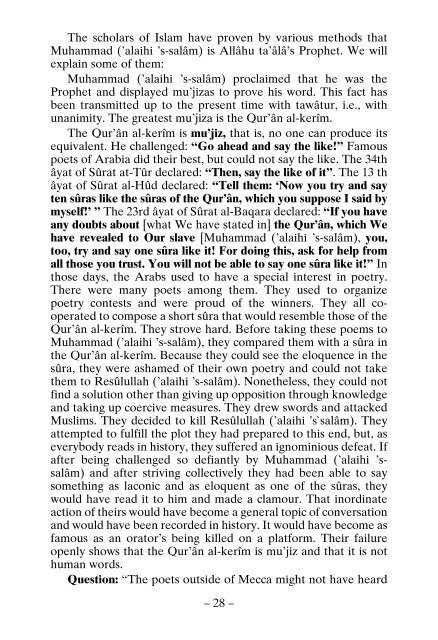The Proof of Prophethood
In this precious book written by Imâm-ı Rabbânî Ahmed Fârûkî Serhendi, one of the greatest savants of Islam, explained are the proof of Prophethood, the special features of a Prophet that distinguish him from other men, a miracle, the Prophethood of Muhammad ׳alayhissalâm. In addition to this, the lives of great savants of Islam such as Sayyed Abdülhakîm-i Arvâsî, Sayyed Fehîm-i Arvâsî, Sayyed Tâhâ-i Hakkârî and Hüseyn Hilmi bin Sa’id Effendi are briefly narrated.
In this precious book written by Imâm-ı Rabbânî Ahmed Fârûkî Serhendi, one of the greatest savants of Islam, explained are the proof of Prophethood, the special features of a Prophet that distinguish him from other men, a miracle, the Prophethood of Muhammad ׳alayhissalâm. In addition to this, the lives of great savants of Islam such as Sayyed Abdülhakîm-i Arvâsî, Sayyed Fehîm-i Arvâsî, Sayyed Tâhâ-i Hakkârî and Hüseyn Hilmi bin Sa’id Effendi are briefly narrated.
You also want an ePaper? Increase the reach of your titles
YUMPU automatically turns print PDFs into web optimized ePapers that Google loves.
<strong>The</strong> scholars <strong>of</strong> Islam have proven by various methods that<br />
Muhammad (’alaihi ’s-salâm) is Allâhu ta’âlâ’s Prophet. We will<br />
explain some <strong>of</strong> them:<br />
Muhammad (’alaihi ’s-salâm) proclaimed that he was the<br />
Prophet and displayed mu’jizas to prove his word. This fact has<br />
been transmitted up to the present time with tawâtur, i.e., with<br />
unanimity. <strong>The</strong> greatest mu’jiza is the Qur’ân al-kerîm.<br />
<strong>The</strong> Qur’ân al-kerîm is mu’jiz, that is, no one can produce its<br />
equivalent. He challenged: “Go ahead and say the like!” Famous<br />
poets <strong>of</strong> Arabia did their best, but could not say the like. <strong>The</strong> 34th<br />
âyat <strong>of</strong> Sûrat at-Tûr declared: “<strong>The</strong>n, say the like <strong>of</strong> it”. <strong>The</strong> 13 th<br />
âyat <strong>of</strong> Sûrat al-Hûd declared: “Tell them: ‘Now you try and say<br />
ten sûras like the sûras <strong>of</strong> the Qur’ân, which you suppose I said by<br />
myself!’ ” <strong>The</strong> 23rd âyat <strong>of</strong> Sûrat al-Baqara declared: “If you have<br />
any doubts about [what We have stated in] the Qur’ân, which We<br />
have revealed to Our slave [Muhammad (’alaihi ’s-salâm), you,<br />
too, try and say one sûra like it! For doing this, ask for help from<br />
all those you trust. You will not be able to say one sûra like it!” In<br />
those days, the Arabs used to have a special interest in poetry.<br />
<strong>The</strong>re were many poets among them. <strong>The</strong>y used to organize<br />
poetry contests and were proud <strong>of</strong> the winners. <strong>The</strong>y all cooperated<br />
to compose a short sûra that would resemble those <strong>of</strong> the<br />
Qur’ân al-kerîm. <strong>The</strong>y strove hard. Before taking these poems to<br />
Muhammad (’alaihi ’s-salâm), they compared them with a sûra in<br />
the Qur’ân al-kerîm. Because they could see the eloquence in the<br />
sûra, they were ashamed <strong>of</strong> their own poetry and could not take<br />
them to Resûlullah (’alaihi ’s-salâm). Nonetheless, they could not<br />
find a solution other than giving up opposition through knowledge<br />
and taking up coercive measures. <strong>The</strong>y drew swords and attacked<br />
Muslims. <strong>The</strong>y decided to kill Resûlullah (’alaihi ’s`salâm). <strong>The</strong>y<br />
attempted to fulfill the plot they had prepared to this end, but, as<br />
everybody reads in history, they suffered an ignominious defeat. If<br />
after being challenged so defiantly by Muhammad (’alaihi ’ssalâm)<br />
and after striving collectively they had been able to say<br />
something as laconic and as eloquent as one <strong>of</strong> the sûras, they<br />
would have read it to him and made a clamour. That inordinate<br />
action <strong>of</strong> theirs would have become a general topic <strong>of</strong> conversation<br />
and would have been recorded in history. It would have become as<br />
famous as an orator’s being killed on a platform. <strong>The</strong>ir failure<br />
openly shows that the Qur’ân al-kerîm is mu’jiz and that it is not<br />
human words.<br />
Question: “<strong>The</strong> poets outside <strong>of</strong> Mecca might not have heard<br />
– 28 –

















